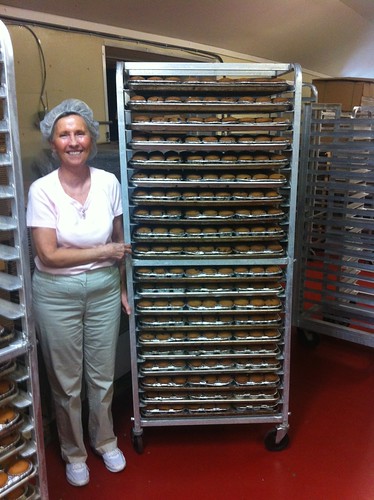
The following guest blog highlights Providence, Rhode Island school district’s exemplary commitment to purchase and source local food into the school meal programs. Going local economically supports RI farms and small businesses and provides opportunities for students to consume healthy, fresh foods and learn how their food is grown and promote healthy food choices.
By Providence Public Schools, Rhode Island
Providence Public School District (PPSD) is the largest school district in Rhode Island, serving 24,000 students. In the heart of New England, PPSD has had historical ties to locally grown agriculture and food for centuries. For the past few years, PPSD requires that RI-grown products compose at least 15% of all food purchases annually, helping to economically support the RI food system with local dollars, while promoting the environmental benefits of local land stewardship.
As part of an innovative “Adopt a Farm” collaboration with Pezza Farm in Johnston, R.I, Sodexo Providence, the district’s food service management company, leases farmland specifically for PPSD school food production. The past four years, PPSD acreage on Pezza Farms has grown from 15 acres to more than 25 acres, producing a variety of vegetables used throughout the District’s school food service.
The management company incorporates locally sourced food into school meals throughout the day. For school breakfast, muffins made by a local bakery not only meet the federal nutrition guidelines but also meet the more stringent Rhode Island Nutrition Requirements (RINR). The muffins are a popular breakfast item with students and often contain locally grown zucchini and carrots as primary ingredients. Steady orders for these muffins, and the bakery’s locally produced breakfast bars, have helped revitalize the company and both breakfast items are now found in several other RI school districts statewide.
PPSD school lunch also incorporates local food into the school day. Every September, Providence schools celebrate the beginning of the school year and the New England harvest season with “All RI Day”. The students receive locally produced Catanzaro’s pasta sauce, local Venda Ravioli pasta and several locally grown vegetables, including fresh spinach, kale, tomatoes, peppers and lettuce. In October, Providence schools celebrate Farm to School Month and National Kale Day. This past October, a kale and quinoa salad and a warm kale and quinoa vegetable side, based on a kale recipe provided by PPSD’s Superintendent Christopher Maher, a kale hero, was featured.
“Insufficient access to healthy food can have serious implications for a child’s physical and mental health, as well as academic achievement,” says Superintendent Maher. “Providence Public Schools are committed to increasing opportunities for local, healthy food in our school meals, which helps our students learn about how their food is grown and how to make healthy food choices.”
PPSD is lucky to have many committed partners in their efforts to use more locally sourced food products. The University of RI (URI) SNAP-Ed Program regularly runs educational programming and taste tests in PPSD elementary schools for menu items that contain locally grown produce. URI SNAP-Ed and Farm Fresh RI also help to promote local offerings in school salad bars and help educate food service employees on the benefits of healthy eating during annual employee trainings and meetings.
A local produce distributor, Roch’s Fresh Foods in East Greenwich, R.I, has been an instrumental partner in ensuring that the district receives produce from a variety of local RI farms. Roch’s also delivers the fresh fruit and vegetable snacks as part of the national FFV Program, giving Providence elementary students even more opportunities to consume healthy, fresh and locally grown foods.



